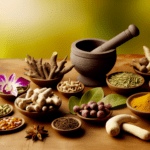Historical Use of Herbs in Medicine
For centuries, herbs have been an integral part of traditional medicine across various cultures. Their use dates back to ancient civilizations, where they were the cornerstone of healthcare. From the Egyptians to the Chinese, the knowledge of herbal medicine was passed down through generations, forming a rich tapestry of natural healing practices. These practices were often closely guarded secrets, with herbalists playing a vital role in the well-being of their communities.
The Role of Plant Compounds in Antiviral Activity
Plants produce a myriad of compounds that serve various ecological functions, including defense against pathogens. These compounds, known as phytochemicals, can exhibit antiviral properties by interfering with viral replication or by strengthening the host’s immune response. Alkaloids, flavonoids, and tannins are just a few examples of plant-derived substances that have been studied for their potential to combat viral infections.
Understanding the Research: Human vs. Test-Tube Studies
When evaluating the efficacy of antiviral herbs, it’s crucial to distinguish between in vitro (test-tube) studies and in vivo (human) studies. In vitro research provides initial insights into the potential antiviral effects of herbs, but these findings may not always translate to effective treatments in humans. Clinical trials and in vivo studies are essential to confirm the safety and effectiveness of herbal remedies for viral infections.
Precautions and Considerations in Herbal Usage
While antiviral herbs offer promising benefits, they must be used with caution. Factors such as dosage, preparation method, and individual health conditions can influence the safety and efficacy of herbal treatments. It is also important to consider potential interactions with conventional medications and to consult healthcare professionals before incorporating herbs into one’s health regimen.
Mechanisms of Antiviral Herbs
How Antiviral Herbs Interact with Viruses
Antiviral herbs contain a variety of phytochemicals that can interfere with the viral life cycle. These compounds may prevent viruses from attaching to host cells, inhibit viral entry, or disrupt the replication process. For example, glycyrrhizin found in licorice root can prevent viral replication by inhibiting the activity of viral enzymes. Similarly, allicin in garlic has been shown to have broad-spectrum antiviral properties, including the ability to inhibit the fusion of viral envelopes with host cell membranes.
The Immune System and Herbal Support
Many antiviral herbs also support the immune system, enhancing its ability to fight off viral infections. Herbs like echinacea and astragalus are known for their immunomodulatory effects, which can include increasing the production of white blood cells and stimulating the activity of macrophages. These herbs may also influence the production of cytokines, which are critical in coordinating the body’s response to viral infections.
Inhibition of Viral Entry and Replication
Some antiviral herbs contain compounds that specifically target the mechanisms viruses use to enter host cells and replicate. For instance, elderberry extracts have been found to inhibit the influenza virus’s ability to penetrate cell walls, while compounds in green tea, such as epigallocatechin gallate (EGCG), can block the replication of viruses like HIV by interfering with reverse transcriptase enzymes.
Herbs and Inflammation Reduction
In addition to direct antiviral actions, certain herbs can reduce the inflammation associated with viral infections. Turmeric, with its active component curcumin, is renowned for its anti-inflammatory properties. By reducing inflammation, these herbs may alleviate symptoms and prevent the excessive immune response known as a “cytokine storm,” which can be particularly harmful in infections like influenza and COVID-19.
Overall, antiviral herbs offer a multi-faceted approach to preventing and managing viral infections. Their complex phytochemical profiles allow them to interact with viruses and the immune system in various beneficial ways, making them valuable tools for maintaining health and combating illness.
Profiles of Notable Antiviral Herbs
Oregano: Beyond the Kitchen
Oregano, a staple herb in many culinary dishes, also possesses potent antiviral properties. The active compound carvacrol has been studied for its ability to combat viruses. Research indicates that oregano oil and carvacrol can reduce the activity of Murine norovirus (MNV) within minutes of exposure. This virus is closely related to human norovirus, a notorious cause of gastroenteritis. Additionally, oregano has shown effectiveness against herpes simplex virus type-1 (HSV-1), rotavirus, and respiratory syncytial virus (RSV), which are responsible for a range of infections from cold sores to respiratory illnesses.
Sage: An Ancient Remedy
Sage, with its aromatic and medicinal qualities, has been revered since ancient times. Compounds like safficinolide and sage one, found in the plant’s leaves and stem, contribute to its antiviral capabilities. Sage extracts have demonstrated inhibitory effects on HIV-1 by preventing the virus from entering target cells. It also shows promise against HSV-1 and Indiana vesiculovirus, further cementing its role as a powerful antiviral herb.
Basil Varieties and Their Unique Properties
Basil, particularly the sweet and holy varieties, has been recognized for its antiviral effects. Sweet basil extracts, containing compounds like apigenin and ursolic acid, have shown potent effects against herpes viruses, hepatitis B, and enterovirus. Holy basil, also known as tulsi, is noted for its immune-boosting properties. Studies suggest that supplementing with holy basil extract can significantly increase levels of immune cells, enhancing the body’s defense against viral infections.
Fennel: A Sweet Source of Antiviral Components
Fennel, with its sweet, licorice-like flavor, harbors compounds that exhibit antiviral activity. Test-tube studies have revealed that fennel extract can exert strong effects against herpes viruses and parainfluenza type-3 (PI-3), which causes respiratory infections in cattle. The main component of fennel essential oil, trans-anethole, has demonstrated powerful antiviral effects, particularly against herpes viruses. Animal research also suggests that fennel may enhance the immune system and reduce inflammation, offering additional support in the fight against viral infections.

Herbs with Multiple Health Benefits
Garlic: A Potent Antiviral and Immune Booster
Garlic (Allium sativum) has been a staple in both culinary and medicinal contexts for centuries. Its antiviral properties are well-documented, with studies showing its effectiveness against a range of viruses, including the human papillomavirus (HPV) and the common cold. Garlic contains compounds like allicin that not only fight viruses but also enhance the body’s immune response. This dual action makes garlic a powerful ally in maintaining health and warding off infections.
Lemon Balm: A Citrusy Powerhouse
Lemon balm (Melissa officinalis), a member of the mint family, is not only a delightful addition to teas and desserts but also a formidable medicinal herb. Its antiviral effects have been observed in test-tube studies against a variety of pathogens, including avian influenza and herpes viruses. Lemon balm’s rich concentration of phenolic compounds contributes to its ability to calm spasms, soothe nerves, and potentially slow viral activity.
Peppermint: More Than a Refreshing Flavor
Peppermint (Mentha piperita) is renowned for its refreshing scent and flavor, but it also possesses potent antiviral qualities. The active components, such as menthol and rosmarinic acid, have demonstrated antiviral and anti-inflammatory activity in studies. Peppermint has been shown to exert antiviral activity against respiratory syncytial virus (RSV) and may also reduce levels of inflammatory compounds, making it a valuable herb for respiratory health.
Rosemary: Culinary Herb with Medicinal Strength
Rosemary (Rosmarinus officinalis) is a fragrant herb commonly used in cooking, yet it also offers significant medicinal benefits. Its plant compounds, including oleanolic acid, have shown antiviral activity against a spectrum of viruses such as herpes and influenza. Rosemary’s antiviral effects, coupled with its anti-inflammatory properties, make it a powerful herb for supporting overall health and protecting against viral infections.

Bette 100% All-Natural Relaxing Lavender Body Lotion.
Chemical-Free
Your relaxing night time body moisturizer to leave the day’s stress behind. Decompress and wish your body good night with the calming scent of lavender.
Herbal Remedies in Traditional Medicine
Echinacea: Native American Healing
Echinacea, also known as the purple coneflower, has been a staple in Native American medicine for centuries. Traditionally used to treat a variety of ailments, its antiviral properties have gained attention in the modern era. Research indicates that Echinacea purpurea may be particularly effective against respiratory viruses, such as the common cold and influenza. Its immune-boosting capabilities are thought to stem from its ability to increase the production of white blood cells, which play a crucial role in fighting infections.
Elderberry: A Natural Flu Fighter
The elderberry, derived from the Sambucus tree, has been used in folk medicine across Europe and North America. Its berries and flowers are packed with antioxidants and vitamins that may boost the immune system. Studies suggest that elderberry extract has a significant effect on influenza virus replication and can enhance immune responses. This natural remedy is commonly found in the form of syrups, lozenges, and teas, and is particularly popular during the flu season for its potential to alleviate symptoms and shorten the duration of the illness.
Licorice Root: An Ancient Antiviral
Licorice root has been utilized in traditional Chinese medicine for thousands of years. Glycyrrhizin, one of its active components, exhibits strong antiviral activities. It has been shown to be effective against viruses such as HIV, RSV, and various strains of the herpes virus. Licorice root acts by inhibiting viral replication and reducing inflammation, making it a powerful tool in the fight against viral infections. However, it should be used with caution as excessive consumption can lead to adverse effects.
Astragalus: The Protector Herb
Astragalus is a cornerstone of traditional Chinese medicine, revered for its protective health benefits. The herb contains polysaccharides, which are known to have immune-stimulating and antiviral effects. Research supports its use in combating viruses like the common cold and hepatitis C. Astragalus is believed to work by stimulating the body’s natural defense mechanisms, making it harder for viruses to take hold and spread. It is typically consumed as a supplement or brewed as a tea.
Incorporating Antiviral Herbs into Daily Life
While these herbs have been used traditionally for their antiviral properties, it is important to approach their use with knowledge and caution. Always consult with a healthcare provider before starting any herbal regimen, especially if you have underlying health conditions or are taking other medications. As research continues to evolve, these ancient remedies may hold the key to supporting health and combating viral infections in conjunction with modern medicine.
Do you know the three main ways that your body gets in touch with harmful chemicals with everyday products? Knowledge is Power!
The Ultimate Detox Guide will tell you how to lower your exposure to harmful chemicals!

Emerging Research on Antiviral Herbs
Ginger: A Spicy Solution for Viral Infections
Ginger, known for its pungent and spicy flavor, is not just a culinary favorite but also a potent antiviral herb. The active compounds in ginger, such as gingerol, have been shown to exhibit antimicrobial and antiviral properties. Research indicates that ginger can fight off various viruses, including the human respiratory syncytial virus (HRSV), which causes respiratory infections. Its ability to reduce inflammation and thwart viral replication makes ginger a promising candidate for broader antiviral applications.
Ginseng: A Root of Antiviral Potency
Ginseng, particularly Panax ginseng, has been revered in traditional medicine for its immune-boosting capabilities. Recent studies have highlighted its potential as an antiviral agent. Ginseng contains ginsenosides, which have been found to inhibit influenza and RSV. Moreover, ginseng’s role in modulating the immune response and its antioxidant activity contribute to its antiviral effects, making it a subject of interest for future research against viral pathogens.
Dandelion: A Weed with Medicinal Properties
Often dismissed as a common weed, dandelion has emerged as a source of antiviral components. Dandelion extracts have demonstrated efficacy in inhibiting the replication of certain viruses in vitro. The compounds in dandelion, particularly taraxasterol, contribute to its antiviral activity. With its wide availability and potential medicinal benefits, dandelion is a promising herb for antiviral therapy research.
Potential of Lesser-Known Herbs in Antiviral Therapy
Beyond the well-researched herbs, there is a plethora of lesser-known plants with antiviral properties waiting to be explored. Herbs like astragalus, licorice root, and echinacea have shown promise in traditional medicine for their antiviral effects. The exploration of these and other underutilized herbs could lead to the discovery of novel antiviral compounds and therapies, particularly important in the face of emerging viral threats and resistance to current antiviral drugs.
By the way, something for you, a little gift!!!
I am just in the middle of publishing my book. It’s about How women can balance their hormones. One part is about food and diet, of course.
Follow this link and enter your email.
I will send you this part of the book for free once the book is published. It has many concrete, practical tips and recipes and will help you feel better during menopause or times of Big hormonal fluctuations.
Annette, Damiva Lead for Health & Wellness

Incorporating Antiviral Herbs into Daily Life
Culinary Uses of Antiviral Herbs
Integrating antiviral herbs into your diet is not only beneficial for health but can also enhance the flavors of your meals. Herbs such as oregano, sage, basil, and fennel are not only culinary delights but also possess properties that can help ward off viruses. Incorporating these herbs into sauces, soups, and marinades not only boosts the immune system but also provides a burst of flavor. For instance, oregano can be sprinkled on pizzas and pastas, while sage can be used to season poultry and stuffing. Basil’s sweet and peppery flavor is perfect for pesto and tomato-based dishes, and fennel’s anise-like taste can elevate the taste of fish and salads.
Herbal Teas and Tinctures
Herbal teas and tinctures offer a therapeutic way to consume antiviral herbs. A warm cup of lemon balm or peppermint tea can soothe the throat and support the immune system during cold and flu season. Tinctures, which are concentrated herbal extracts, can be taken directly under the tongue or added to water. Herbs like echinacea and elderberry are commonly available in tincture form and are known for their antiviral properties. These preparations are not only effective but also convenient for daily consumption.
Consulting Healthcare Providers Before Use
Before adding antiviral herbs to your regimen, it’s crucial to consult with healthcare providers, especially if you have underlying health conditions or are taking medications. Some herbs can interact with prescription drugs or may not be suitable for everyone. A healthcare provider can offer guidance on the appropriate use of herbal remedies and ensure they complement your health plan safely.
Future Directions in Herbal Antiviral Research
The potential of antiviral herbs is vast, and ongoing research continues to uncover their mechanisms and applications. As scientists delve deeper into the antiviral properties of herbs, we can expect to see more evidence-based recommendations and innovative uses in healthcare. The future may hold more herbal-based treatments that offer natural and effective options for preventing and managing viral infections.
By incorporating antiviral herbs into our daily lives through culinary practices, teas, tinctures, and with professional guidance, we can take proactive steps towards maintaining our health and well-being in a natural and holistic manner.









